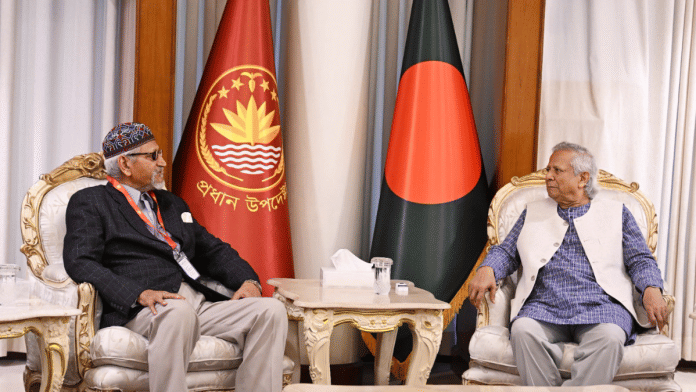New Delhi: Bangladesh should occupy India’s seven northeast states if the neighbouring country attacks Pakistan, a senior official appointed by the Muhammad Yunus-led interim government has said.
The remark of Major General (retired) A.L.M. Fazlur Rahman, the chairperson of the National Independent Commission of Inquiry probing the 2009 Bangladesh Rifles (BDR) massacre, comes at a time when Dhaka’s ties with New Delhi has seen a downturn after ouster of former prime minister Sheikh Hasina in August last year.
“If India attacks Pakistan, Bangladesh should occupy seven states of North East India. In this regard, I think it is necessary to start a discussion on a joint military system with China,” Rahman posted Tuesday in Bengali on Facebook.
The post was endorsed with a ‘like’ by fellow commission member Shahnawaz Khan Chandan, who is a former member of the Islamist student group Islami Chhatra Shibir. Chandan, an assistant professor in Dhaka’s Jagannath University, is someone whom Yunus is said to have “placed complete trust” with.
The timing of the post can hardly be missed as it comes amid heightened tensions between India and Pakistan post the Pahalgam terror attack. In a slew of sweeping punitive actions, India has kept the 1960 Indus Waters Treaty in abeyance, closed the Integrated Check Post at Attari, and downgraded diplomatic ties.
In contrast, Bangladesh has warmed up to Pakistan amid diplomatic chill with India post Hasina’s ouster. The two countries held their first foreign secretary-level talks in nearly 15 years this month in Dhaka, aiming to address bilateral and historical issues.
The talks follow quiet diplomatic overtures, including eased visa rules and renewed engagement on 1971-related grievances. A visit by Pakistan’s Deputy Prime Minister Ishaq Dar is also expected later, currently on hold amid growing tensions.
Who is Fazlur Rahman
Rahman headed the BDR when the paramilitary force killed 16 personnel of the Border Security Force (BSF) in the 2001 Bangladesh-India border clashes. Now elevated to a status equal to a Supreme Court appellate division judge, the retired army officer has vowed to uncover the “foreign conspiracy” behind the 2009 Pilkhana killings.
Rahman has maintained that the original mutiny probe covered up a deeper conspiracy. “We aim to determine whether any foreign entity was involved in the carnage,” he previously said, alluding to alleged Indian interference.
Rahman’s latest remark is likely to cause further strain in ties with India, as it comes after Bangladesh’s interim leader Muhammad Yunus last month asserted that Bangladesh—not India—is the only true gateway to South Asia, in a meeting with Chinese officials.
“The eastern part of India, known as the Seven Sisters, is landlocked. They have no access to the ocean. We are the only guardians of the ocean in this region. This opens up huge possibilities,” Yunus said in a video of the meeting that has gone viral on social media.
He added that Bangladesh could serve as “an extension of the Chinese economy—building, producing, and marketing goods for China and the world.”
What is the independent commission
The National Independent Commission of Inquiry was set up in December 2024 to re-investigate the failed 2009 paramilitary mutiny and its aftermath, including the claims of foreign involvement.
During the uprising, BDR soldiers went on a violent rampage at their Dhaka headquarters, stealing thousands of weapons and killing their commanding officers. The mutiny quickly spread nationwide before it was crushed by the army. Seventy-four people, including 57 army officers, were killed in the carnage.
Since Hasina’s ouster in August 2024, families of officers killed in the mutiny have pushed for the case to be reopened, accusing her of undermining the military to consolidate power. The original trials, conducted under her government, led to mass convictions via special courts—criticised by the United Nations for lacking due process.
Amid renewed investigation, local media outlet Amar Desh Patrika also revived claims that Indian intelligence agency Research and Analysis Wing (RAW) orchestrated the 2009 massacre, allegedly bringing in trained assassins disguised as athletes and patients who later fled on a delayed flight.
The report said former home minister Sahara Khatun’s Hotel Imperial in Farmgate was allegedly used as a safehouse, while CCTV footage from the scene was reportedly destroyed by then BDR chief Moinul Islam. Despite being summoned, many key suspects in the Hasina administration allegedly evaded questioning.
(Edited by Tony Rai)
Also Read: 1971 or 2024? A political battle in Bangladesh over when the nation found true liberation







As usual modi is busy in election rally while bsf is left to die alone